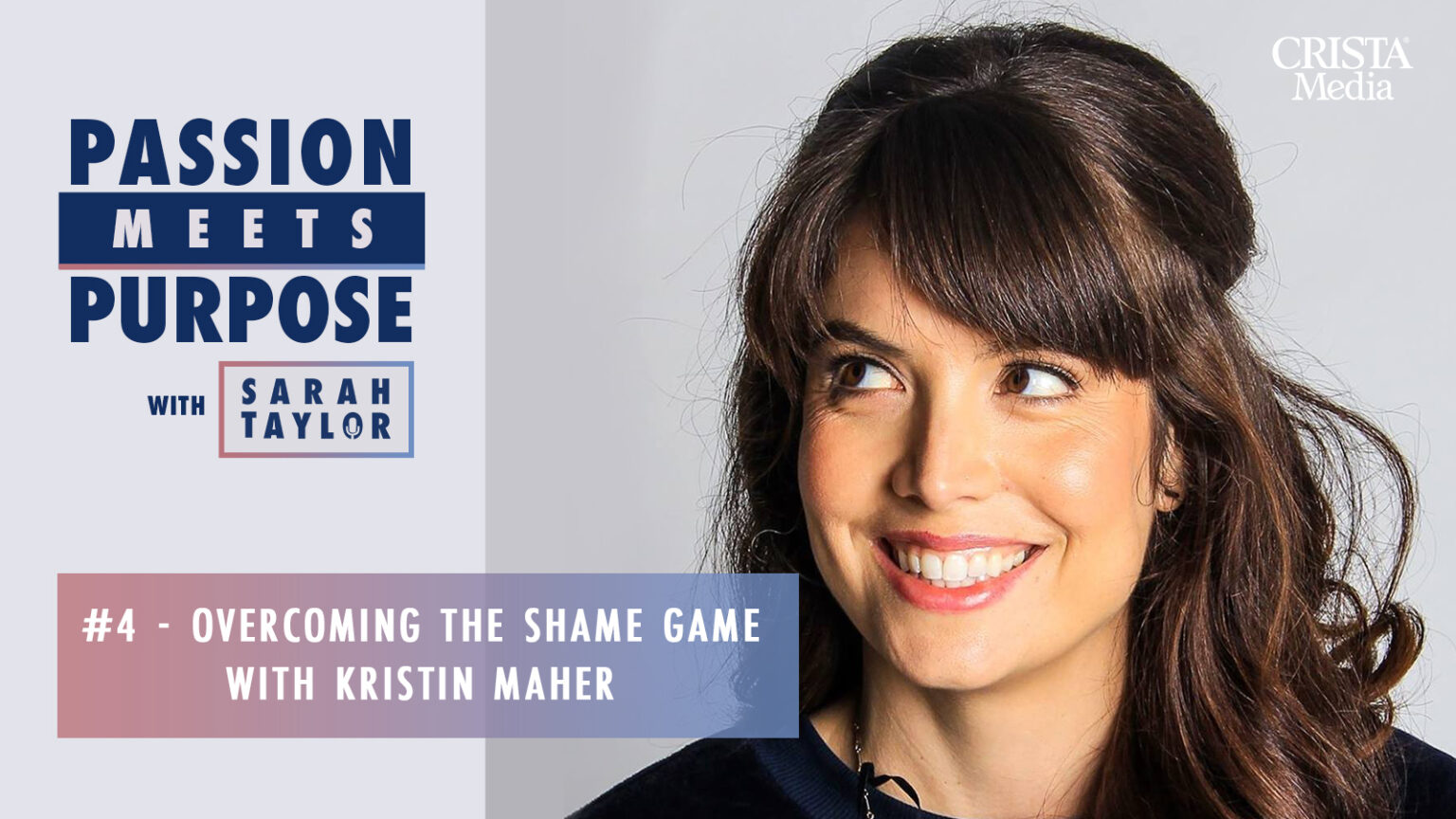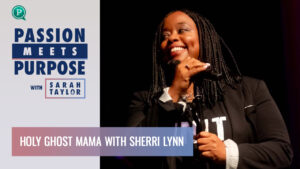What do you do when you need resources to help your kids overcome feelings of shame, and you can’t seem to find any? You create your own! Sarah chats with Kristin Maher about her children’s book The Awfulizer, homeschooling, and overcoming shame talk (both in ourselves, and our kids!)
Listen to “Overcoming Shame with Kristin Maher” on Spreaker.
Special thanks to Northwest University for sponsoring the Passion Meets Purpose Podcast!
Interview Links:
- Follow Kristin Maher Online | Facebook | Instagram
- The Awfulizer
Transcription:
Kristin Maher: You are a better parent and you are a better spouse and a better friend and a better daughter and a better grandmother, if you take that time to recharge yourself so that you have enough in your tank to give to others.
Sarah Taylor: That is Kristen Maher and I am so excited for today’s conversation that we’re bringing to you on the Passion Meets Purpose podcast.
My name is Sarah Taylor. I’m your host, and thanks to Northwest University for sponsoring this, making it possible. So, so grateful for them. Now, I bet you didn’t think I’m going to just go out of my way to listen to a podcast about shame, but here you are. And not only just like shameful thoughts that we think, and maybe you’re thinking you don’t deal with that too much.
I think we all do subconsciously and it has been just so enlightening listening to Kristin, talk about her, uh, her own struggle with this, and then how she saw it reflected with her oldest, her son. Kristin is a mom of three. Um, my favorite thing about her is that when she couldn’t find any resources to help with parenting and thoughts of shame, She created her own.
She’s a published author. The book is called The Awfulizer and we’re going to link to it in the show notes. It’s one of those children’s books that like, you’re reading it to your kid, but then all of a sudden you’re feeling the tightness in your chest of, Oh wow this applies to me too. Um, so we’re going to have a great conversation today about that and several other topics, Kristin is super smart.
Um, so is her husband a singer songwriter, Matt Maher. I feel like if I ever had like actual dinner with them, I would have to like you have my phone handy so I could Google a thesaurus of some of the words that they say. Um, they’re wonderful and delightful in our conversation begins as Kristin talks about what it’s like to be a new homeschooler. How’s that going?
Kristin Maher: We are four weeks into homeschooling and it’s been very interesting and I’m very, as someone who suffers from shame, I keep looking at everyone else going, am I doing this right? I don’t think I’m doing this right. Everything I’m doing is wrong. We can’t get done pretty quickly, which technically is the benefit of homeschool, but I’m saying I’m doing it all wrong.
Why are we getting done so quickly? You’re not teaching your kids enough. Um, but the kids have been really enjoying it. They miss their friends, but we try to have play dates so that they can still play with their friends. But we just wanted it to have was such an uncertain time that we’re in right now versus going in and out potentially at school, we thought it might be better to have a more consistent
schooling process for the beginning of the year, just so we, we saw how things were going and also because of where we are in the year Matt’s actually home, this is the longest he’s ever been home for us as a family. And so he teaches like the first half of homeschool, which has been really exciting for him.
And he really loves having that time to be with the kids cause he missed a lot. Yeah. That time being out on the road. And so it’s catching up really.
Sarah Taylor: Well, we’re going to actually come back to that. Cause you recently wrote a piece about seeing some perfectionistic tendencies in your oldest and I think a lot of us I’ve got three kids as well.
We’re noticing things in our kids that we’re also seeing reflected in ourselves and the Paul coming out in the dynamic of educating and being like a parent, but then a teacher to that in a second. But before we do a, because you’ve written a children’s book, um, I want to get a little bit of a backstory of how that book came about, because what I love that you did was you, you went searching for resources
in your parenting to explain of shame with your son and between you and your counselor, you couldn’t find any resource so like an awesome mom you made your own. So go ahead and talk a little bit about how that came about.
Kristin Maher: Sure. Um, well, I unbeknowing, to me had suffered from shame for most of my life, um, because of issues in my childhood, my grandmother raised me for a large part.
She was the home care at my, my parents were at work and she was emotionally abusive. And so I kind of grew up with a lot of messages early on about how someone who’s supposed to love me, hated me and how everything was always my fault. And so it just kinda set the tone for my life for a very long time.
And one day actually having a fight with Matt, it kind of, I saw how much it was affecting me and how much her voice was still inside, and so I started therapy. And that really changed my life. And I was doing individual therapy and I was in a group of five other women for shame. And that’s when I started to recognize once I had been like a year or two in, I could hear my kids saying some stuff that I was like, Oh no, those are like, I’m the worst,
I’m the, I’ll never going to get this. I’m awful. And it’s you think that’s innocent, but the more you tell yourself, those things, the more you believe them. And I was like, that is shame talk and I do not want my kids to have to go through what I went through my childhood and my young adult years, um, being controlled by this voice, the shame voice, the awfulizer, um, and so I met, I made an appointment right away with the school counselor.
I was like, I think my kids are struggling with shame. I can’t really find anything to help them talk about it. Is there anything you would recommend. And so she just started looking and she was like, well, there’s nothing that really deals with shame. Interestingly, there is stuff about perfectionism, um, but not shame, which can be actually an underlying cause for perfectionist.
And so one day at group, we were doing a work and I was like, I’ll be the awfulizer, which is what I call shame. And my therapist was like, that’d be a great name for a kid’s book. And I was like, you know what? It would like, why don’t I try? And so I did. And. Here we are.
Sarah Taylor: And so The Awfulizer is a book about a little boy named James. He’s eight years old, he’s on the school bus and he’s thinking what?
Kristin Maher: He’s remembering how he got in trouble in class and how everyone laughed at him in his class and how that made him feel. And once he, the awfulizer kind of whispers into him, he starts out small and manageable, it just being like, I bet everyone thinks you’re really bad now, but they know you’re a bad kid.
And once you agree with that first statement, he brings up more stuff to remind you of all the ways that you’ve been bad and proving to you that you are awful. And that you’re a bad person that everybody knows it. And that basically no one can love you because you’re so stark and bad for lack of a better term.
Sarah Taylor: And then. Talk about how he grows the awfulizer grows, but there’s something that eventually makes him shrink.. Right. And so The Awfulizer
Kristin Maher: rose and so as shame grows in your life, you can respond to it in a couple of different ways. For James, he really shrinks, he stops raising his hand. He stops talking.
He stops engaging as much and people notice, and finally his parents come to him and talk to him. And then they’re like, can you talk to us, tell us what’s going on. We’ve noticed you’re different. And so finally, He gets all his courage, instead of just saying, I’m fine. He actually tells his parents what’s wrong.
And about The Awfulizer everything he hears in his head. And he finds out that he’s not the only one who hears The Awfulizer. And talking about it with his parents. He thinks The Awfulizer shrink and gives him the super power of awesomizer, because he’s able to talk about his feelings. He’s able to share what he’s going through, and that gives him control and power over The Awfulizer.
Sarah Taylor: Is there a story that comes to mind from a parent that was reading this to their child and they told you what it sort of unlocked in their communication?
Kristin Maher: I’m been really surprised by how many people have actually started using The Awfulizer like their kids are using it now, when they’re talking with their parents. I’ve had that comment a lot that it’s just become part of the vocabulary or they’ll be like, Oh, The Awfulizer is telling you this today.
And The Awfulizer has been saying that and it just gives them a way to speak about something that maybe they didn’t know how to express before. One of the things we do in group a lot is, um, work is like role-playing and you’ll use bears and things. And so having something external that you’d be like, this is what’s going on in my head sometimes really helps to make you be able to understand it a little better and communicate about it.
Sarah Taylor: That sounds great. It’s one of those tricky children’s books where you’re reading it as a parent and you’re reading the words out loud and then you’re internalizing them. Cool.
Kristin Maher: I’ve heard that as well.
Sarah Taylor: Um, in fact, your most recent blog entry that you did is other books that you consider to be great resources for talking with kids about concepts like these, which a lot of families in the middle of the year 2020 were excellent resources.
Do you want to pick one or two? It will link below this, but what’s one or two that have really helped you lately.
Kristin Maher: Oh man. There’s so many that I think are amazing. I’m trying to think of the specific ones. We just recently did one that I didn’t, um, post on there because we just really started reading it this week, but it’s called Speak Up, which I think is a wonderful book.
And it talks about different situations where you can speak up about things that maybe see someone getting picked on, or someone’s spreading rumors about somebody and you know, it’s not true. And so it’s great because it shows you a picture and we kind of went through the different situations with my kids
so I’ll be like, well, what do you think the person needs to be speaking up about in this situation? One is like a little girl’s in the library and everybody’s running around and talking and not paying attention. And. So they’re like, well, they’re there. I was like, where are they? And then in the library, I’m like, is this how you behave when you’re in the library?
No. And so then we find out how she spoke up to be able to tell the kids, Hey, that’s not right. Or with the rumor one, I’m like, what do you think the rumor is that they’re telling about this boy? And what would you do? So it’s just great to start conversations. I feel like. As a parent for me in my, when I go to bed at night, I have a thousand ideas about how I’m going to talk to my kids about complicated issues.
And I’m like, Oh, this will be the perfect way to do it and it’s going to be amazing and so heartfelt. And then the next day comes and I forget everything, all my brilliant ideas. And so having a book to start the conversation has really helped us talk about things. Another one we did. Be Where Your Feet Are At by Julia Cook as about mindfulness and staying present, where you are, which as a homeschool parent is becoming more and more of an issue because it’s easy to be distracted. Even as me, like I’m sitting here trying to teach my kids, but then I’m reaching for my phone to check the being and see what’s happening.
No, be where your feet are. And so that’s a good one for us too, to like kind of check each other. Like, are you at your feet at right now? Those are the two that we’ve been referencing a lot. These past week.
Sarah Taylor: We’ll put the whole link below because every single one of these books are the tricky books where we’re teaching our kids
and then the whole time it’s all completely applying to us.
Kristin Maher: Yes. Yeah. And now I will say that anytime I’m like, Oh, I should talk to my kids about that. The first thing I do is I Google book about, and there’s so many you can get from the library. You can buy them. It depends on like what the topic is. Like.
It’s just a weird time. I use the library, but. Some of them we just have right here in the homeschool room and we’ll pull it out and be like, this is a go-to.
Sarah Taylor: So with the homeschool and another thing you’ve recently written about is seeing some of your tendencies go ahead and describe when you say perfectionist, what do you mean behind that, because you see the traits in your son and then you see them in yourself
and so you guys are working through that, right?
Kristin Maher: Yes. So a lot I grew up thinking of perfectionist was a good thing because that meant they were doing their best and they always went that little extra mile to make sure their stuff was perfect. Not realizing there’s a, a really kind of a darker side where when you don’t get it perfect
there is a meltdown and there is a shaming voice that comes out. And there’s just a complete lack of wanting to try new things, because you’re like, well, I’m not going to get that perfect. I can’t do it. Right. I know I can’t do it. Right. So I’m just not going to do it. And we’ve been seeing that more and more with our oldest.
And so. I realized I do a lot of the same things too. Um, they have a perfectionist tend to have a difficulty with criticism. We try to remind ourselves in our children that people only criticize or give feedback when they care. If they didn’t care, they wouldn’t be telling you what you’re doing wrong.
But for perfectionist, all they’re focusing on is I did it wrong. It’s not, Oh, they care enough for me to be better. They’re seeing all the things, all the mistakes I’m making. Another thing is it’s an all or nothing mentality where even if they got a 99 on a test, they are freaking out about that one question they got wrong.
And so the whole test is ruined for them because they got that one wrong. They can’t see their achievements. All they can see is where they failed. Looking back I did a lot of the same things. I remember crying once cause I got a B on a test and my parents are like, You are so good at school. Why are you upset about this?
And I’m like, I disappointed you. And they’re like, you did better at school than we have ever. When have you ever asked you to get a specific grade? And I was like, Nope, you never have, but something in me was like, if you don’t get an a, you’re letting everybody down. And so that’s kind of what drives perfectionist.
And you can see how, if you keep listening to that voice in that drive depression, it can be a common issue. Um, some people would just deal with perfectionism had eating disorders. Um, suicidal tendencies when it gets really dark. So there’s a lot of negative of aspects you don’t necessarily associate or think about when you think perfectionist, you think, Oh, that’s great,
they really want to get a hundred on everything, but the drive there is what you kind of have to unlock and see what’s behind it and make sure when they don’t get the hundred they’re okay. Cause the perfectionist is not.
Sarah Taylor: More with Kristin Maher in just a moment about the way that we key in, on what each of our kids needs.
Like that’s her oldest son, but then her daughter completely differently wired. And we’re going to talk a little bit more about that, but first I want to thank Northwest University because they totally caught the vision of the Passion Meets Purpose podcast. And I think that makes sense since their whole goal is to offer you a faith based community where you can grow and learn.
And Northwest University’s expert professors have been equipping students to be effective leaders in their fields since 1934, they offer undergraduate and graduate programs, both in-person and online. The best part right now is there’s a tuition freeze that’s still in effect. So that means that if you’re brand new at Northwestern University, your tuition bill is unchanged for the entire 2021- 2022 school year.
In fact, Northwest University’s tuition remains lower than all other Christian schools in Washington and they’re low room and board rates save students thousands of dollars. They’ve got technology majors like brand new state-of-the-art technology studio. It’s open their majors include UX design, data science, video production, audio production, and computer science.
Those programs add to the already diverse offering of top programs in business, nursing, education, sciences, communication, psychology, music, humanities, and more. At Northwest University year. Future isn’t canceled, it’s just beginning.
Now, back to our episode with Kristin Maher we were recently talking about her oldest son and his struggle with perfection tendencies.
And now we go to her middle daughter, Rowan. Uh, tell me Kristin, like how do you pivot on a dime to adapt to each of your individual kids and what causes shame in their life? Like what, what’s your insight on that?
Kristin Maher: Um, a lot of it is, conversation is kind of, most of my kids will run when they’re upset. And so it’s finding where they have run to and sitting there and waiting until they get to a point where they can talk about it.
And sometimes they can’t right away and I’ll be like, okay, I’m going to leave you alone for a little while you, big thing we try to emphasize is that it’s okay to have feelings. Like you can feel sad, you can feel angry. I’m going to let you have these feelings and then I’ll come back and we’ll talk about it so they can have some time to process.
Um, but it’s just consistently following up. I will say that we have noticed the perfectionist issue for about a year a year now. So it took me a year to figure out the timer. Um, but it was just continually talking and listening to what is bothering them and trying to figure out, well, let’s try this.
Okay. If that didn’t work, let’s try this and keep going back and going back and not thinking like one conversation is the end. Um, you have to keep following up and even like with the timer, it’s a reminder to myself, as I say this, I need to follow up like next week and be like, Hey, do you think this is working for you?
It seems to be working, but is that what is really happening for you? And so I think the biggest thing is communication and just showing your kids that you care about what they think and care about what you feel and that it’s okay to have those feelings. Now, that being said kind of referencing Rowan,
they do have a rule that you’re allowed to have feelings that your feelings don’t let you do whatever you want. So if you’re feeling angry, that does not give you the right to hurt people verbally or physically, but you can be angry. So there is a line there where you’re allowed to have feelings, but your feelings aren’t allowed to control your actions.
You guys post some pretty great pictures last night, it was a Instagram video of all three of your kids singing some sort of a Broadway musical on their walk. It was Tomorrow at the top of their lungs as we walk through the neighborhood at like 7:30 and I was like, you’re welcome everybody. You’re welcome.
Sarah Taylor: And that’s not new. That’s sort of a thing people can predict, because I think at the beginning of the quarantine, I saw a video where she had a microphone on the front porch and was serenading the neighborhood as well.
Kristin Maher: At the beginning of quarantine, she assessed obsessed with musical Matilda.
And so every night at roughly five o’clock, you could count on her to be there with a microphone and speaker and she would sing and act out most of the musical. She had put a paper explaining what she was doing on the tree. And her biggest issue is when people would walk away before she was finished, not realizing that they probably going to dinner or just walking their dog.
And so that was her come down moment. I’m like, well, baby, they have to, they have other things they have to do. I’m sure they loved your performance, but you have to keep walking. I mean, most people would stop and clap, but they couldn’t stay for the hour long production that happens every night.
Sarah Taylor: Oh, I love it so much. Um, okay. One of the other things that you wrote about, and I just, I loved it. You talked about, um, like taking some time for yourself each day.
Kristin Maher: Yes.
Sarah Taylor: Quiet time. Like your kids go have time alone. You have time alone and how you have to really push past the desire to do the dishes or vacuum or anything productive because you’re an enneagram 2
so you can talk about that for people that don’t know what that is. And then talk about what changed, like how did you finally get to a place where you were able to do something for yourself in that half hour or hour? And then how did that benefit you moving forward?
Kristin Maher: Okay. Well, it was difficult. Uh, enneagram 2 reference is someone who is a martyr and has to please everybody else before they can please themselves.
So, so they don’t see a lot of value and self and figuring out what you want. It’s all about what other people want and what other people think about you. And so you’re always constantly serving. Uh, kind of the Martha. I always am a big fan of Martha and like Martha, she did. I’m like, what dinner would you eat if Martha wasn’t there, also realizing that Mary played a big part, but my tune is always team Martha.
Um, so for the longest time, the only way I could justify my me time was saying, well, by taking this time for myself, I’m a better mom and I’m a better wife. So I’m kinder to my kids, into my husband. If I take a half an hour or an hour and work out or take a nap, whatever it might be going and writing this book, um, I had to justify it through the lens of someone else, and I’ve been really working on that with therapy.
And so I’m still not always a hundred percent there, but I feel like it’s gotten to the point where I’m like, it’s good for me and that’s good enough. And sometimes that’s the hardest statement to make, because we’re taught that that’s selfish. You can’t be selfish. You shouldn’t think about yourself, not realizing that our mental health is really important.
And if you need to look at it in the sense that you are a better person to everybody else, you encounter, when you take care of yourself and you make sure you’re healthy and rested, then that’s what you should do. You are a better parent and you are a better spouse and a better friend and a better daughter and a better.
Grandmother, if you take that time to recharge yourself so that you have enough in your tank to give to others.
Sarah Taylor: And if someone wants to read even more about that, like even some of the things, if they’re like, if this is such a new concept to them and they need like bullet points on what to even do during that half an hour, you have a few that wrote about, and so we’ll link up to the blog below for that as well.
So, Gosh, Kristin, thank you so much for your time today.
Kristin Maher: Thank you.
Sarah Taylor: And you have a website, kristinmaher.com, where you write about some of the things we’ve referenced today, and my hope is I know you’re busy, busy doing the homeschool thing and everything, but maybe when the kids are doing for you, I really hope that you’re just leaning into that even more, because I really love your voice in this space.
I hope that you are secretly working on another children’s book or something.
Kristin Maher: I have two, one I’m working on is a follow-up to The Awfulizer that deals with someone who’s already had shame for a long time in their life. And then another one is about anger. So I’m kind of going back and forth between the two and then try and find more time to like, write your blogs.
I will have, you know, that after this, I am going to write another blog cause I have a new thing that I need to talk about.
Sarah Taylor: That’s great. Wonderful. Well, thank you so much. And, um, Yeah, it’s just an honor to be able to talk with you today and we really appreciate it. I hope we get to do it again soon.
Kristin Maher: Anytime. I love it. I love talking to adults. It makes me excited.
Sarah Taylor: Me too. It’s it’s a highlight of the day grown-up conversation. Um, if you want to find out more, like I said, with Kristin Maher we have it all linked for you in the show notes. I think we’re even doing a giveaway of The Awfulizer book. So definitely check that out as well.
Our thanks to Northwest University as always so grateful that they’re keeping this Passion Meets Purpose podcast going, and also thanks to you, not just for listening, but for your excellent feedback on, uh, on some of your wishlist of guests, I’m going after the comedians next, like Naper Godsy, Jim Gaffigan,
uh, Michael Jr. I would love to find out more about how, um, some of our favorite comedians that offer family friendly, relatable humor uh, look back on times that have been really difficult and dark and seasons of depression, and then find the laughter amidst it all and then give those laughs to the rest of us.
That’s kind of where my mind has been at lately, but I’d love to know from you, who would you like on the podcast and, um, and what your story is? Our email address for this is super easy. It’s [email protected]. Yeah. Just email us [email protected]. Um, let’s see you can rate. And what else did they tell me to say we release new episodes every other week.
So like every two weeks on Wednesdays, he probably figured that out by now. I’m just going to wrap this up. Thank you for listening. Your time is valuable. I’m glad we got to spend this part together.
Follow this podcast:








